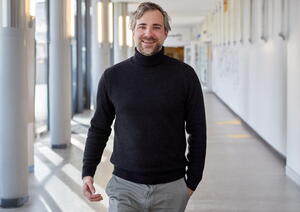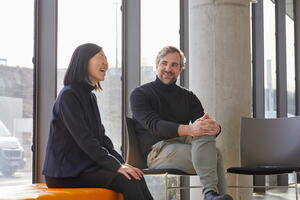Staff Stories

#shining beacon of hope;
#Russia;
#Machine Assembly Program;
#life in Provence;
#colllaboration;
#respect;
Vladimir Tronza is a Manufacturing and Assembly Engineer for the Machine Assembly Program. He oversees a group of stakeholders charged with the technical scope of the ITER tokamak assembly, acting as an intermediary between ITER engineers who designed the system and who prepare the assembly instructions, and the assembly contractor—an external company that executes machine assembly.
“I see ITER as a shining beacon of hope. I think we are working on an important experiment because we are a research project, which is basically the first key milestone to mastering fusion energy. It’s like opening a new page in the history of energy.”
While the biggest challenges of the job are related to technical complexity and organizational factors, Vladimir also finds that ITER’s rich cultural and generational diversity can sometimes make interpersonal communication tricky. “While I personally prefer to be rather direct, some of my colleagues do it differently.” For example sometimes in meetings a colleague notices that an agreed-upon technical specification will not work, but because their personal and cultural mores indicate that challenging someone—especially a more experienced colleague—is inappropriate, they may not feel comfortable raising an alarm. This breakdown in communication can cause minor but avoidable setbacks. “Before you start doing something, you need to be really clear about what needs to be done. If your requirements are not complete, you might have a problem later. It can cause a delay because the team will have to backtrack.”
Vladimir’s solution to this challenge starts with curiosity and observation—keeping a keen eye on how team members communicate in meetings and noticing if someone seems hesitant to respond. Such situations also require an approach of patience and sometimes reaching out to reticent colleagues and giving them an opportunity to express themselves one-on-one. “You cannot be too busy, or too selfish and only push your own agenda.” For Vladimir, the most important ITER CARE values are respect and collaboration, but he also believes strongly in open-mindedness. “Diversity is an advantage, a unique chance to learn from each other. Any good collaboration must allow for compromise, which is interesting for both parties.” He says it is easy to have this openness because it is already a part of the ambiance at ITER. “It’s nice and friendly. Everyone wants everyone else to be comfortable. That helps in keeping your mind open.”

As a native of Moscow, Vladimir was nervous about not living in a big city. But he says he was able to embrace the lifestyle of the south of France and now wouldn’t like to exchange it for anything else. “Aix-en-Provence is not a regular provincial town. It has a decent cultural scene that benefits from musical and theater festivals, exhibitions of world-famous artists and cinemas that offer a selection of international films.” Aix also is surrounded by a stunning world of nature to explore, including the iconic Sainte Victoire mountain. And being so close to Marseille means easy access to discover other nearby countries and scenery. “Taking a weekend trip abroad was never easier for me.”
